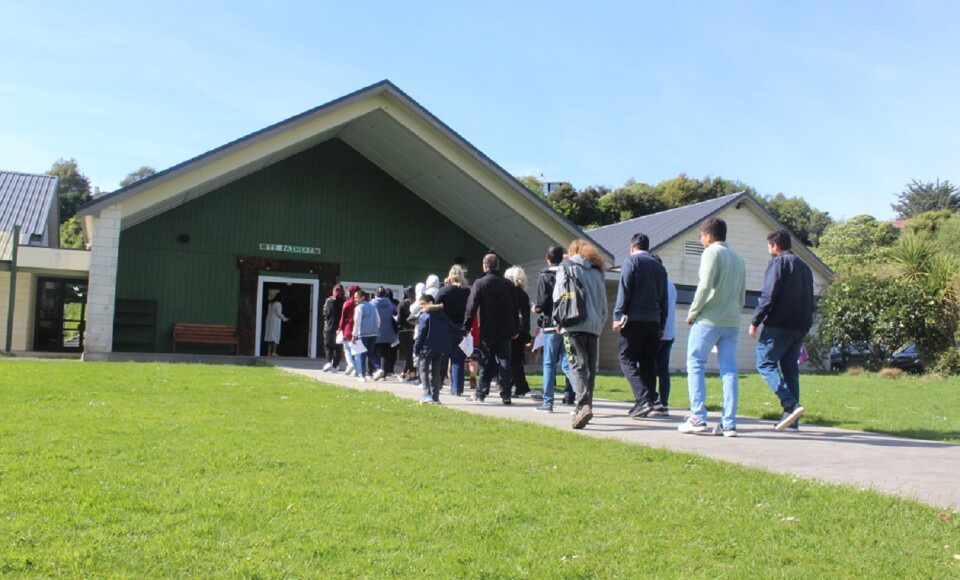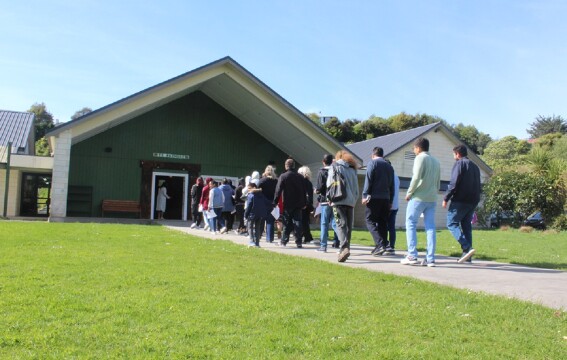Araiteuru marae welcomes former refugees with a pōwhiri
9 November 2023


In October, Araiteuru marae in Ōtepoti | Dunedin welcomed manuhiri | visitors including former refugees who are building their lives in Aotearoa, with a special pōwhiri.
Asef Barez, one of 22 manuhiri who attended, found the pōwhiri very touching. He said it reminded him of cultural connections, origins, and former refugees’ journeys to Aotearoa New Zealand.
“I was born in Afghanistan and forced to leave my home. In another corner of the world, I have been embraced by people who are kind-hearted and full of love. They have taken away my pain, suffering, and sorrow and replaced this with love, kindness, tenderness, and smiles,”
Asef Barez
Former refugees at the pōwhiri agreed that being on the marae made them feel like they were back home.
Ghusoon Khashmiri arrived in Dunedin in May this year from Iraq. She feels the marae and its people are like family. She said, “I enjoy being on the marae because I feel like I am amongst my family, and working in the kitchen and sharing food with others is fun.”
Araiteuru marae holds community pōwhiri twice a year, to welcome newcomers to the marae. Kelly Campbell (Te Arawa)' our Pathways to Settlement Manager in Dunedin said the pōwhiri helps connect newly arrived families and the Māori community to build a collective culture.
“Individuals or families want to get to know Māori, but they often hesitate, thinking, ‘How do I talk to them’? The pōwhiri can help people overcome barriers and they realise that they are also part of the community and build a sense of belonging,” she said.
Araiteuru marae is an urban marae gifted by Kāi Tahu. It represents the four winds and Māori who reside in Ōtepoti and iwi elsewhere in Aotearoa.
Fifty people gathered for the pōwhiri including, hosts, former refugees, Red Cross people and those we work with to support former refugees in the community.
New Zealand Red Cross has been supporting former refugees in Dunedin to rebuild their lives since 2016.
Pōwhiri process

Hosts, visitors, and Red Cross people during the pōwhiri
At the beginning of the pōwhiri, the importance of the welcome in Te Ao Māori is explained to the guests. Kelly said, “the process is not based on faith or religion, but it's a spiritual practice in Māori culture. Anyone can join this welcoming process regardless of their religious beliefs.”
The pōwhiri begins with a karanga, a call by the hosts, and is responded to by the visitors. On the visitor side the karanga was done in Persian. It has been done in Arabic before, but this was the first time in Persian by team member Mona Tavakoli.
During the whaikōrero guests and hosts share information about themselves, their ancestral connection, their history, and the present. People were speaking in Te Reo Māori, Persian/Dari, and Arabic. Kelly said, “it's not about understanding the language, it's about sharing the feelings and making an emotional connection through kōrero.”
Tania Sharee Williams (Ngāpuhi)' from Araiteuru marae started the conversation with the history of Māori and colonisation, specifically He Whakaputanga | Declaration of Independence. The group then talked about some of current situations and conflicts around the world.
Val Paris, our Pathways to Employment Manager for Dunedin also attended the pōwhiri. She said, “families were very happy and emotional as they were speaking and singing songs in their languages inside the marae.” They sang a traditional Islamic poem Talaʽ al-Badru ʽAlaynā, in Arabic as a waiata.

Preparing for a hākari feast at Araiteuru marae in Oct 2023
Then the pōwhiri share in hongi which is pressing your forehead and touching noses with the other person. This is an important part of the pōwhiri as it is the sharing of breath which lifts the tapu and then everyone becomes noa | equal.
This means that everyone can then enjoy a hākari | feast together. When people share food, the differences will disappear and a sense of integrity will increase, Val said.
“It was nice to see Māori and former refugees cooking, eating, and laughing together. This pōwhiri and marae will give hope and boost the confidence of the former refugees so they can thrive in the community.”
How you can help
There are plenty of ways you can get involved with former refugees in your community.
- Our volunteers are extraordinary community helpers who welcome new Kiwis.
Become a refugee support volunteer
- Our teams work with refugee-background job seekers who have a vast range of skills, qualifications, and employment histories.
Give a former refugee a job opportunity
- Business partnerships are critical to our work helping people in New Zealand and overseas. Explore different ways your business can support our work and make an impact.
Partner with us
How we support
- Pathways to Settlement supports former refugees in New Zealand when they begin their settlement journey.
- Pathways to Employment helps people from refugee backgrounds to work and supports employers to increase diversity in their organisations.
